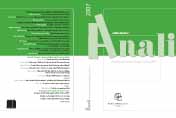Ustavi socijalističke Jugoslavije i država sljednica: kontinuitet ili diskontinuitet u koncepciji ustavnog identiteta
The Constitutions of Socialist Yugoslavia and Successor Countries: Continuities Or Discontinuities In the Understanding of Constitutional Identity
Author(s): Vedrana BaričevićSubject(s): Politics / Political Sciences
Published by: Hrvatsko politološko društvo
Keywords: constitution; constitutional identity; constitutions of Socialist Yugoslavia; Yugoslavia and successor countries; ethnonational concept of identity
Summary/Abstract: The paper analyses the constitutions of Socialist Yugoslavia and successor countries. The author shows that it is possible to identify a continuity of constitutional identity when the issue of the basic subject of constitutional identity is taken as an object of comparison. In both cases, the constitution grants primacy to one group in the country – working class and nation, respectively – and the position of the citizen within the system is derived from his affiliation with the titulary group. The analysis of constitutional identity of successor countries also shows that in these countries the point at issue cannot be the construction of a model of a civil constitutional identity, even though it is defined that way in the constitutions of these countries. The basic principles of these constitutions are peculiar to the constitutions classified as ethnonational constitutions, where the affiliation with a national group determines the political subjectivity. The effect of such understanding of constitutional identity is the creation of a community whose basic values are exclusive of those members of society who do not belong to this particular group. The author, however, shows that even those countries which are classified as civil countries contain elements of an ethnonational concept of identity, even though they do not constitute the foundations of the constitution and community themselves. For example, in civil countries such as France and the US the dominant culture and language are imposed to all members of society, i.e. the integration of members of the community is based on assimilation. In addition, the paper shows that, as often as not, a disproportion between the proclaimed civil values and actual practice exists even in these countries. Still, it would seem that a higher level of integration and civil tolerance is present in those systems where basic values are built on more inclusive concepts. On these grounds, in the last section of the paper, the author examines the relationship between the constitution and culture.
Journal: Anali hrvatskog politološkog društva
- Issue Year: 2007
- Issue No: 04
- Page Range: 203-225
- Page Count: 23
- Language: Croatian

